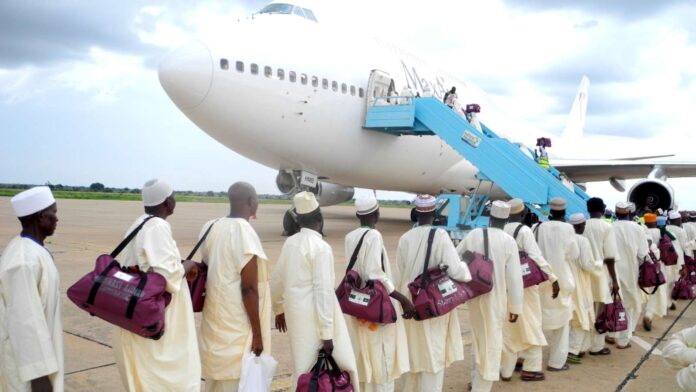The National Hajj Commission of Nigeria (NAHCON) will on Tuesday begin the airlift of Nigerian pilgrims from Saudi Arabia after they spent 41 days in the holy land.
This was announced by the hajj commission’s Head of Aviation of, Engr Goni, on Sunday during the post-Arafat meeting of hajj stakeholders in Makkah, Saudi Arabia.
He said the outbound airlift will begin on Tuesday, June 4, 2023 from King Abdulaziz International Airport Jeddah.
Nigeria began its pilgrims airlift on Thursday, May 25, 2023 in Abuja with Nasarawa State contingents.
The inaugural airlift of the Nigerian pilgrims had unprecedentedly began with a rescue operation by Max Air as Aero Contractors failed to produce an aircraft for the official airlift of the first batch of Nigerian pilgrims to 2023 hajj in Saudi Arabia.
Engr Goni said every pilgrim would spend minimum of 37 or maximum of 43 days before being airlifted back to Nigeria.
Despite repeated assurances by Mr Zikirullah Kunle Hasan-led NAHCON leadership of reducing the number of days pilgrims spend in Saudi Arabia, his management could not achieve that in their two operations, not even last Hajj when Nigeria had only 43,000 pilgrims as its quota. That year’s pilgrims ended up spending over 38 days.
All this have exceeded even the NAHCON – approved 35 days stipulated in its hajj fare breakdown of 2022 that was made public.
Findings have shown that 2023 is among the years Nigerian pilgrims spent the highest number of days in Saudi Arabia in recent past.
Before 2022, the average number of days spent by Nigerian pilgrims in Saudi Arabia was 35 – 37 days, according to previous NAHCON hajj reports submitted to the Office of the Secretary to the Government of the Federation (OSGF).
Not long after they came to office in 2019, the NAHCON Commissioner for Policy, Personnel Management and Finance (PPMF), Alhaji Nura Hassan Yakasai, in an interview with BBC Hausa, questioned why Nigerian pilgrims should spend over 30 days in Saudi Arabia while “hajj is done within five days.” He vowed to reduce the number of days spent in the holy land to two weeks. Which observers described as wishful thinking because the Man knows nothing about Hajj operations.
One of the members of the Senate Committee on Foreign Affairs that screened the current hajj commission leadership in 2019 has expressed concern “over NAHCON’s leadership inability to fulfill any of the operational promises it made during the screening at the National Assembly.”
“Barrister Zikirullah promised to reduce hajj fares. He ended up jerking it from N1. 4 million to over N3 million. He promised to reduce the number of days pilgrims spend in Saudi Arabia, but extended it from over 30 days to 43 days. This is really worrisome,” the former senator who spoke in confidence said.
The lawmaker said the current NAHCON board has “failed in all its operational promises it made before the Senate and the Nigerian public.”
He said the leadership has been preoccupied with internal wrangling and terrible scheming for undeserved second term.
The lawmaker’s assertion can be seen from the confessional confusion being churned out by the top officials of the commission in the wake of the mess witnessed during hajj days in Muna and Arafat.
In an interview with BBC Hausa on Monday afternoon, NAHCON Commissioner of Operations Abdullahi Hardawa admitted that they “encountered the same problems of tents shortage, influx of illegal pilgrims, lack of food and water, poor sanitation and uncollected refuse dumps like they did in 2022 in Muna and Arafat.”
Observers have described Mr Hardawa’s interview as admission of official negligence, operational incompetence and laxity on the part of NAHCON for condoning the same problem in the same place for two consecutive years.
On their part, some pilgrims have informed this newspaper their resolve to “demand for full refund for the Muna services.” They have also threatened to drag NAHCON to court over the Muna mess “because NAHCON contracted the Masha’er service providers on their behalf.”
Efforts to get details breakdown of this year’s Hajj as was the established tradition failed.







